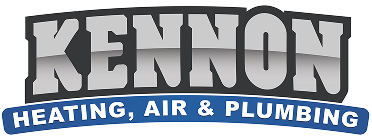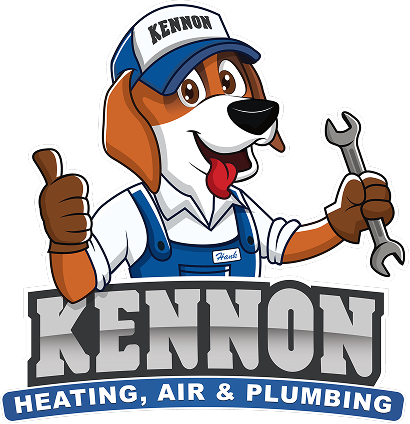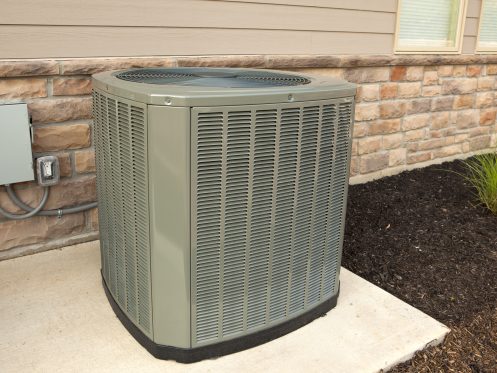If it’s time to replace your HVAC system or you’re just looking to upgrade to lower your energy bills, you have a wide range of options to choose from. One option that’s definitely worth considering is installing a heat pump. While heat pumps cost more than traditional HVAC systems, they provide many benefits that can make it well worth paying the higher price. In this article, we’ll explain everything you should know about heat pumps and how to decide if one is right for your home.
What Is a Heat Pump?
Based on sight alone, you’d never be able to tell the difference between a heat pump and a standard central air conditioner. Not only do they look identical, but they also use the same heat transfer process to cool a house. The way the process works is that cold refrigerant continually gets pumped inside and absorbs heat from the air coming into the system as it flows through the evaporator coil.
When the now warm refrigerant enters the outdoor unit, it then gets compressed and becomes extremely hot. This results in all of the heat being released into the air outside as the refrigerant flows through the condenser coil. In more basic terms, the system cools by capturing and removing heat from the house and then releasing it outside.
The term heat pump comes from the fact that a heat pump can pump heat from outside to inside to keep the house warm during the winter. The heat transfer process a heat pump uses when operating in heating mode works the same way, just in reverse. That means cold refrigerant flows through the outdoor coil and absorbs heat from the air flowing over the coil. The hot refrigerant then releases the heat into the air inside the house as it flows through the indoor coil.
How Well Do Heat Pumps Work?
The fact that heat pumps and traditional air conditioners use the same process means that they will work equally as well at cooling your home. A comparable heat pump and central AC will also use the same amount of energy and cost the same to run.
Where heat pumps really excel is in heating efficiency. This is especially true in places like Georgia, where it rarely gets overly cold during the winter. Gas furnaces, electric furnaces and all other types of electric heating convert gas or electricity directly into heat, which limits how efficient they can be. Most types of electric heating are around 100% efficient, meaning they convert electricity into heat at a one-to-one ratio.
The very best gas furnaces are only around 98% efficient, meaning that 2% of the gas they use is wasted. Conventional gas furnaces are only around 80-85% efficient, as they can only capture so much heat from the combustion fumes. The remaining 15-20% of the heat ends up flowing outside and being wasted.
By using energy to transfer heat instead of just directly converting it into heat, heat pumps can achieve efficiency ratings of 300% or higher. While their efficiency decreases in colder weather, this generally isn’t something you’ll need to worry about in Georgia. While a heat pump heats more slowly than other types of heating, you’ll still have no issues with it keeping your house warm unless the temperature outside is near 0 degrees.
Even then, a heat pump should keep you sufficiently warm as long as you keep your thermostat set at a constant temperature so your heating never shuts off. Most heat pumps can continue to heat in temperatures as low as -15 to -23 degrees, which is far colder than it ever gets in our area.
How Much Can You Save With a Heat Pump?
The savings you can expect to get with a heat pump depend largely on the model you choose and what type of heating you currently have. Compared to a gas furnace, your heating costs will typically be at least 25-33% lower with a heat pump. If you currently use any other type of electric heating, a heat pump can easily save you more than 50% on your heating bills.
While even a 50% reduction in heating costs may not add up to a huge amount in our climate, it can help offset the higher cost of a heat pump compared to a traditional central AC. The other important thing to consider is that you only need to pay to install and eventually replace a single system when you go with a heat pump, which will typically save you at least a few thousand dollars compared to having separate heating and cooling systems.
Additional Benefits of Installing a Heat Pump
Heat pumps provide other benefits in addition to lowering your heating costs. For starters, the fact that a heat pump is all electric and more energy efficient means that it’s better for the environment and will lower your carbon footprint.
You may also qualify for various incentives and rebates if you choose to install a heat pump. For instance, if you install an ENERGY STAR-rated heat pump before the end of 2025, you’ll be eligible to claim up to a $2,000 credit on next year’s federal income taxes. If you instead install an ENERGY STAR-rated gas furnace or standard AC, you’ll only be eligible for up to a $600 tax credit. Many utility companies have their own rebate programs for homeowners who switch from another type of heating to a heat pump.
Are There Any Downsides to Heat Pumps?
The only real potential downside to a heat pump is that it may not last as long as traditional HVAC systems. Furnaces and air conditioners usually last for around 15 years, while heat pumps can fail in only 10-12 years. Nonetheless, this shouldn’t come as much of a surprise considering that heat pumps get used during summer and winter instead of just one or the other. The slightly shorter life expectancy also isn’t much of an issue, considering how much you’ll save by only having to replace a single system instead of two systems.
The other potential concern with a heat pump is that it may break down more times or require more repairs over the course of its life. However, this is usually less of an issue if you have your heat pump professionally serviced and inspected twice a year. Twice-yearly maintenance also helps to prevent a heat pump from failing earlier and ensures that it continues to cool and heat efficiently and effectively.
In terms of the overall maintenance requirements, there’s no difference between a heat pump and traditional HVAC systems. In either case, you should have the system serviced once in the spring before you need to turn your AC on and then again in the fall before you need to start running your heating.
For award-winning HVAC services in Cumming, GA, and the surrounding areas, look to Kennon Heating, Air & Plumbing. As a Lennox Premier Dealer, we offer efficient, long-lasting heat pumps, ACs and furnaces from one of the most trusted names in the industry. When you choose us for your AC installation, you can be certain you’ll get the right unit for your home and that it will be installed correctly and work exactly as it should.
For honest advice and quality service you can depend on, contact Kennon Heating, Air & Plumbing.



